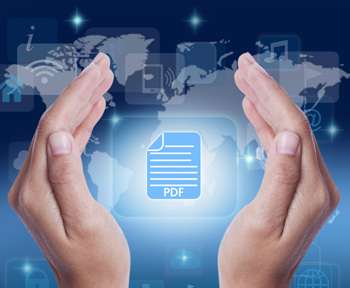
Insurance organizations are under intense pressure to transform to digital to keep pace with the rest of the business world, streamline processes, improve operations and meet customer demands. By adopting smart, new document management solutions, more and more insurance organizations are seeing the benefits of moving on from legacy systems. These new digital solutions can help influence the ability of professionals in the insurance field to stay competitive and increase output. A recent rise in PDF (Portable Document Format) innovation has led the business tool to become an amazingly helpful resource for organizations looking to move their processes away from paper and on to digital platforms.

These new tools make it easy for customers to submit their claims, signatures, inquiries, etc. through the web and mobile apps. In addition to that, they help improve the interaction between the insurance companies and their customers.
Benefits of Using New PDF Technology
There are several benefits in utilizing innovative PDF technology in the insurance industry. These include:
- Helps convert paper to digital – With reliable PDF conversion services paper scans can be converted to searchable PDF files, and compressed to reduce the size of the file.
- Helps access the documents from anywhere – With new PDF technology; the insurance industry can securely access documents online from a computer, tablet, or Smartphone.
- Enables agents to get a signature immediately – Most insurance sales take place over the telephone, and customers and agents may not be in the same location. PDF software helps customers to put their digital signatures on documents immediately. Digital signatures generated within PDF software comes with an in-built authentication process, which captures information about who signed the PDF document along with the date and time. There are sophisticated insurance apps with PDF functionality that automatically send the completed document back to the agent or the agent’s home office while giving customers a copy for their records.
- Helps email archiving for claims management purposes – Insurance companies have to work with adjusters, investigators, attorneys and appraisers and a lot of email communication is involved. These emails must be archived and kept accessible for a long time. Now, insurance providers implement systems to automate email archiving and these systems automatically convert email attachments (typically in Microsoft product formats) into PDFs ready for archiving. Since tags and meta data are added, search is streamlined as well.
- Helps in preserving the documents for long – Converting documents to PDF/A, the industry standard for archiving documents, helps in long-term preservation of electronic documents.
- Helps in sharing the information safely – Innovative PDF technology allows to securely share documents containing confidential information with redaction and file protection.
With efficient document conversion software a reliable document conversion company can help convert documents in various formats to PDF. What makes the PDF an appropriate file format? PDF solutions can help provide security to those organizations instituting them, as new technologies are making PDFs more traceable and controllable. These advances can be achieved by embedding PDF documents with an identity and connecting them in the cloud, which in turn allows authors to have more control over their documents and confidential data even after a document leaves the premises. The creators can track the usage of their document and security features will follow it regardless of where it goes.



